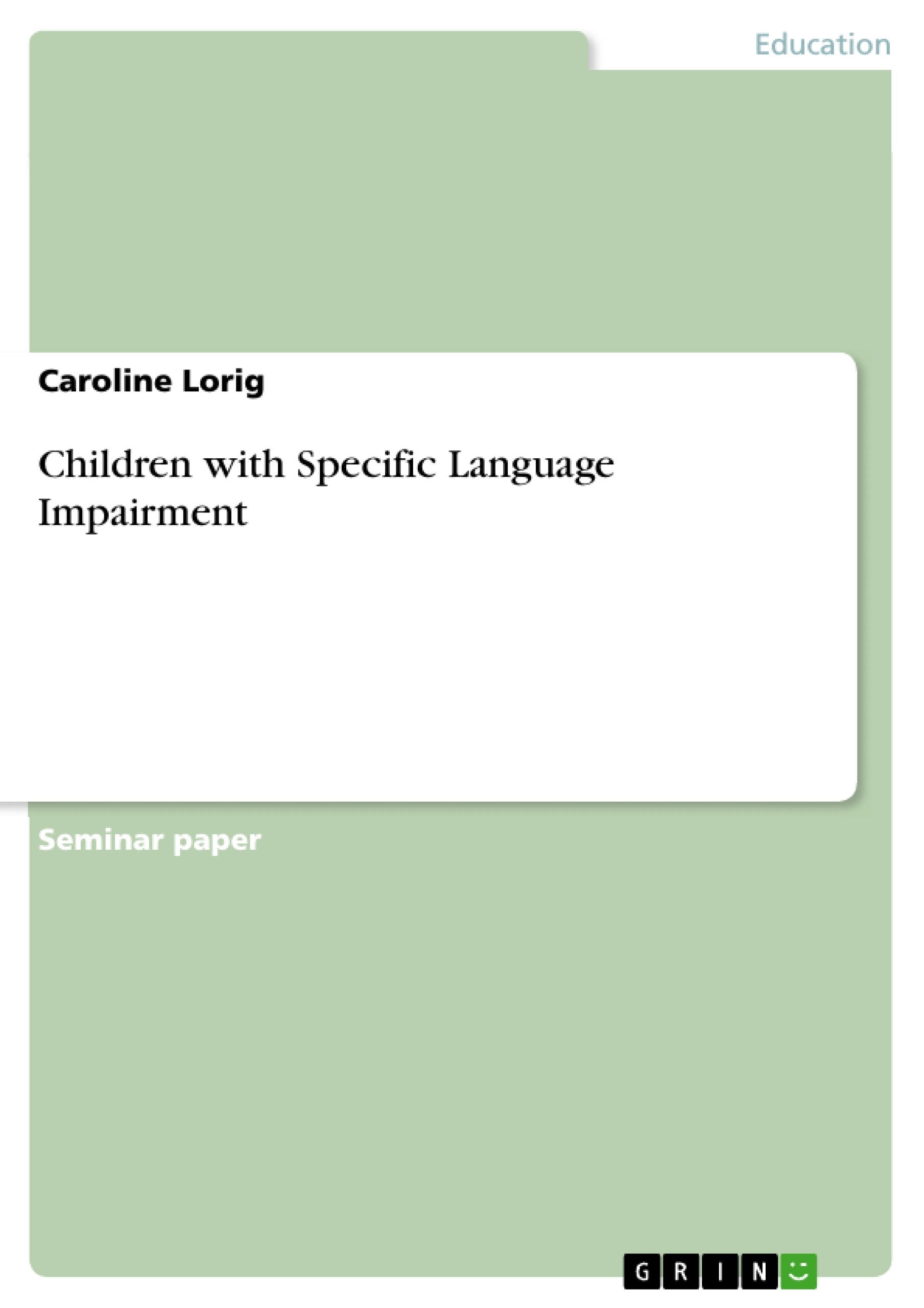Introduction
The infantile language acquisition is, under normal circumstances, a quick as well as robust event in every child’s life. Naturally, a child is able to acquire the language it is surrounded by rather easily, effortlessly and successfully. After all, it usually leads to accurate and fluent language habits which are not impaired in any way. “In most children, normal language development depends on opportunity, good hearing and the absence of underlying neurological problems” (Warwick 2003, p.11). If, on the other hand, the infantile development is impaired, e.g. due to cognitive, social-emotional or sensory deficits, the language acquisition may often be affected, too. Apart from this, there are many children (approximately 15%) who do not use more than 50 words and barely any elaborate word combinations when they are two years old, even though they don’t show any primary impairments (cf. Dannenbauer 2003). No apparent reason for their delayed language development can be found. Still, not less than half of these so-called “late talkers” are able to (linguistically) catch up with their peers in pre-school age (cf. ibd.).
However, the other part of those “late talkers” can reveal compact and persistent deficiencies in their receptive and/ or expressive use of language without showing any primary impairment such as mental retardation or another disability. Even so, these children remain behind their contemporaries in their language comprehension as well as language production. Individual children whose language is impaired in that way, in spite of being cognitively “normal”, are diagnosed with “Specific Language Impairment”. This paper will deal with this language disorder and try to show an outline of this phenomenon.
Inhaltsverzeichnis (Table of Contents)
- 1 Introduction
- 2 Definition of Specific Language Impairment
- 3 Areas of difficulty of children with SLI
- 3.1 Pronunciation and lexicon
- 3.2 Grammatical deficits: syntax and morphology
- 4 Literacy development of children with SLI
- 5 Conclusion
Zielsetzung und Themenschwerpunkte (Objectives and Key Themes)
This paper aims to provide a comprehensive overview of Specific Language Impairment (SLI) in children, focusing on its definition, areas of difficulty, and impact on literacy development.
- The definition and characteristics of Specific Language Impairment
- The various areas of difficulty experienced by children with SLI, including phonology, morphology, syntax, lexicon, and literacy
- The challenges and strategies related to language acquisition and literacy development in children with SLI
- The importance of early identification and intervention for children with SLI
Zusammenfassung der Kapitel (Chapter Summaries)
The first chapter introduces the concept of Specific Language Impairment (SLI) by contrasting typical language acquisition with the challenges faced by children with SLI. It discusses the prevalence of SLI and the difficulty in establishing a universally accepted definition due to its heterogeneous nature.
Chapter 2 delves deeper into the definition of SLI, highlighting its distinct characteristics as a language impairment that affects different structural levels of language, including grammar, phonology, semantics, and pragmatics. The chapter emphasizes that SLI is not associated with other disabilities such as intellectual impairment, hearing impairment, or neurological abnormalities.
Chapter 3 explores the specific areas of difficulty experienced by children with SLI, focusing on their struggles with pronunciation, lexicon, grammar, and literacy development. The chapter examines the challenges related to vocabulary acquisition, grammatical structures, and the impact of SLI on reading and writing skills.
Schlüsselwörter (Keywords)
Specific Language Impairment, SLI, language acquisition, language development, phonology, morphology, syntax, lexicon, literacy, reading, writing, early intervention, language disorders, developmental language delay.
Frequently Asked Questions
What is Specific Language Impairment (SLI)?
SLI is a language disorder where children exhibit persistent deficiencies in language comprehension and production despite having normal cognitive abilities and no sensory or neurological deficits.
How do "late talkers" differ from children with SLI?
Many "late talkers" (who use fewer than 50 words at age two) catch up by preschool age, whereas children with SLI show long-term language difficulties.
What are the main areas of difficulty for children with SLI?
Difficulties typically occur in pronunciation (phonology), vocabulary (lexicon), grammar (syntax and morphology), and literacy development.
Does SLI affect reading and writing skills?
Yes, the impairment often has a significant impact on literacy development, making it challenging for children to acquire fluent reading and writing habits.
How prevalent is SLI in children?
The paper suggests that while approximately 15% of two-year-olds are late talkers, about half of these may go on to show persistent language impairments characteristic of SLI.
Why is early identification of SLI important?
Early identification and intervention are crucial to help children overcome language barriers and minimize the impact on their overall education and social integration.
- Quote paper
- Caroline Lorig (Author), 2007, Children with Specific Language Impairment , Munich, GRIN Verlag, https://www.grin.com/document/86095



